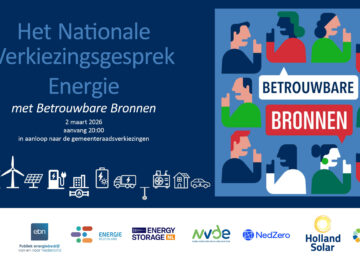Grid operators and energy suppliers together tackle full power grid in residential area
Network operators and energy suppliers will work together with households to address congestion on the electricity grid in residential areas. In this way, households can continue to count on a reliable energy supply in the future. Network operators Liander, Stedin and Enexis are pulling together with Essent, Vattenfall and Eneco to achieve this. By encouraging consumers to shift their energy consumption to times when the grid is less busy, overloading is prevented. "Thanks to this project, customers can make an important contribution to this, and benefit financially themselves. A win-win for everyone," said Resi Becker, CEO of Essent.
The electricity grid is getting busier and busier, and so it is becoming increasingly important to use the grid efficiently. This cooperation between grid managers and energy suppliers will stimulate this, because especially during the winter months - when people come home from work - a lot of electricity is demanded at the same time. That rush can overload the grid. If households spread their electricity consumption over the day, they can help prevent that.
Consumption at quiet times
The approach initially targets 21 areas where the electricity grid is too busy at peak times. In total, about 35,000 households are involved. Starting in early July, the suppliers will ask their customers in this area if they want to participate in this project. The starting point is that households who participate do not have to sacrifice comfort, but do benefit. For example, by giving them a financial compensation if they charge their car at night. Or by offering them a home battery with an extra discount, under the condition that this battery is used at certain times to reduce the pressure on the electricity grid. It is up to energy suppliers to decide how they will try to reduce electricity consumption at busy times and what compensation will be offered to households in return.
"With this collaboration, we can really make a difference in spreading electricity use throughout the day," says Maarten Otto (CEO of Liander) on behalf of the participating grid operators. "And that's badly needed, because in some neighborhoods at certain times of the day the electricity grid is so busy that the voltage is too high. Grid operators are expanding the grid in abundance, but that alone is not enough. By using the grid more flexibly together, we keep the power supply reliable for everyone in the neighborhood."
Potential is great
The potential of this collaboration is great: in a recent trial of home electric car chargers, many people proved willing to charge their cars at quiet times. During this trial, their power consumption during the evening peak decreased by an average of 68%.
"It shows that households can play a crucial role in reducing pressure on the electricity grid," said Resi Becker (CEO of Essent) on behalf of the energy suppliers. "But it won't happen by itself. We are going to make it as easy as possible for households to contribute. With smart, technical solutions and financial compensation for participants. We have already taken many stand-alone initiatives as an industry and learned a lot from them. Now it's time to scale up further and actually make a difference. And because we are doing it collectively, it can really make an impact. And that helps everyone."
Other market participants are invited to participate in this project as well. Solar Plan has already accepted that invitation.
Energy Storage NL response: opportunities for storage
Energy Storage NL welcomes this cooperation as a necessary step to cope with the growing pressure on the electricity grid. In this, the deployment of flexibility from the market is no longer a luxury, but a precondition for a reliable energy supply. The announced cooperation is therefore seen as a good step towards obtaining more flexibility from the market. For storage, this includes a broad look at fair and market-based flex compensation, from residential storage to large-scale storage. Initially, work is being done mainly through pilots to create preconditions for flexibility. ESNL hopes for a rapid upscaling so that flexibility will take further shape on a national level. ESNL will be involved in shaping further agreements on this.





